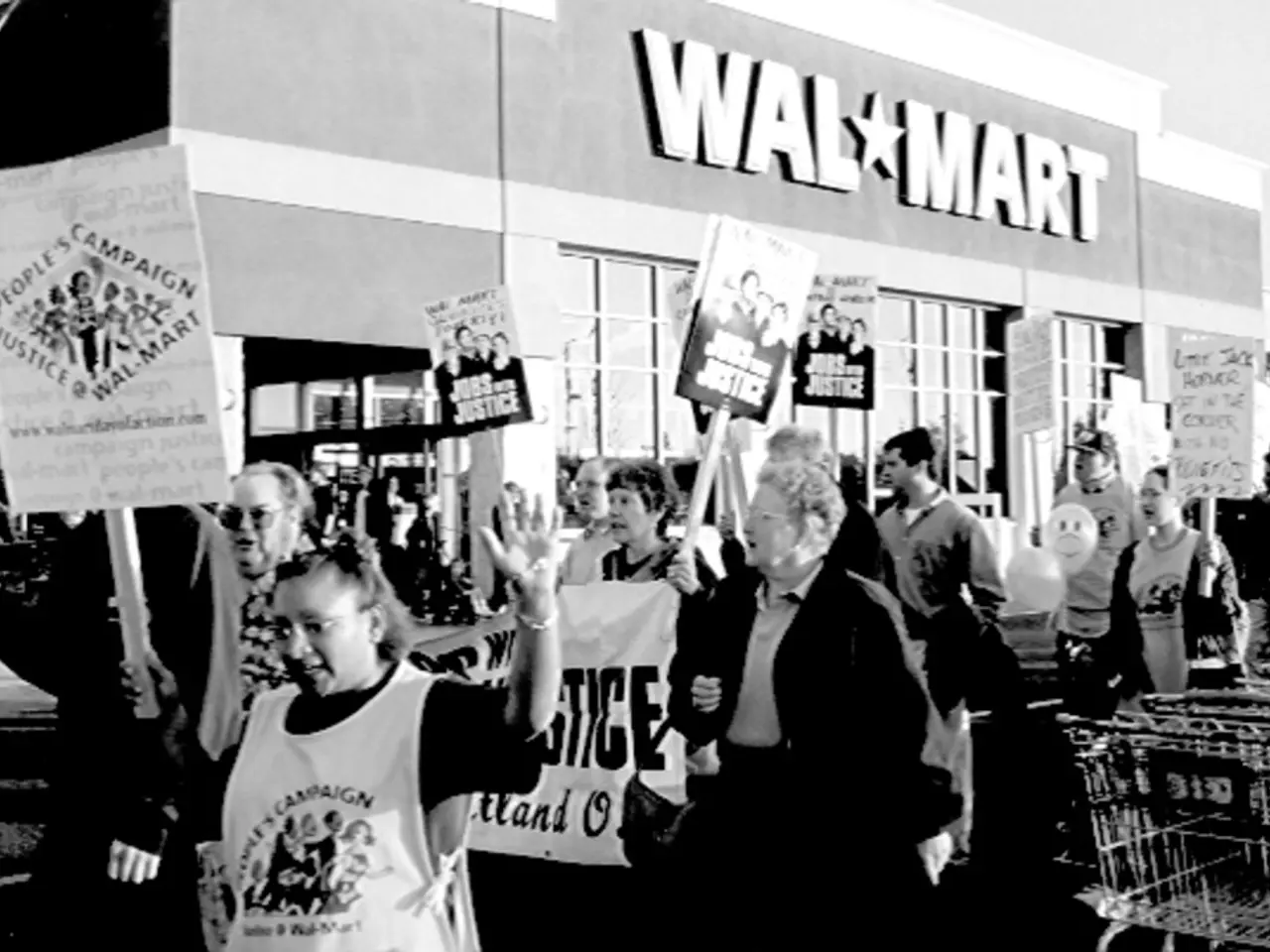Demonstrators congregate at the White House, voicing their discontent against Trump's tough enforcement actions in D.C.
In the heart of August 2025, Washington D.C. found itself at the centre of a political storm when President Donald Trump invoked Section 740 of the District of Columbia Home Rule Act, placing the Washington D.C. Metropolitan Police Department under direct federal control and deploying National Guard troops [1][2][3]. This move, justified by concerns about violent crime and public safety, allows Trump to federally oversee the D.C. police for up to 30 days without Congressional legislation, as per a 1973 law that otherwise grants the city local autonomy over its police force [1][2].
The response to this move has been mixed. D.C. Mayor Muriel Bowser expressed compliance with the federal order but framed it as further evidence of the city's need for greater self-governance and statehood [1]. She described the action as "unsettling and unprecedented" but implied it reflected tensions from prior rhetoric [1]. On Capitol Hill, Democrat Rep. Jamie Raskin vowed to introduce legislation to overturn the takeover, while Republican leaders, including House Speaker Mike Johnson, praised Trump's decision [2]. The Metropolitan Police Department signaled cooperation with federal partners despite the unusual federal intervention [1][2].
The protesters, who marched to the White House on August 16, were demanding an end to the "crime emergency" that Trump declared in an executive order on Monday. They chanted slogans like "Shame" and "Trump must go now!" [4]. Mason Weber, a teenager from Maryland, attended the march and expressed concern about the deployment of troops, calling it a "serious ethical and legal breach" [5]. Weber also expressed concern about the lack of checks and balances in the systems of power.
D.C. residents, such as John Smith and Catherine Ernst, are decrying the deployment of the National Guard and Trump's growing influence over D.C. police activities [6]. Smith believes Trump is exaggerating about the city being riddled with crime, as crime has actually decreased overall [7]. Ernst thinks it's important to show opposition to Trump's actions.
The protesters were rallying against President Trump's attempted takeover of the city's police department. Sam Goldman, organizer of the march and spokesperson for Refuse Fascism, is planning for more protests in D.C. in the coming weeks [8]. Goldman also stated that it's time for more people to make their voices heard against Trump and MAGA.
West Virginia Gov. Patrick Morrisey has agreed to send 300 to 400 of his state's National Guard troops to D.C. to support Trump's crackdown [2]. Over the weekend, South Carolina's governor also announced he was sending 200 troops, while Ohio pledged 150 troops [2]. However, earlier in the week, Vermont's Republican Gov. Phil Scott denied a similar request for National Guard troops to support the Washington deployment [2].
Trump officials backed off that effort after D.C. Attorney General Brian Schwalb filed a lawsuit in federal court [3]. On Aug. 16, 2025, Attorney General Pam Bondi attempted to appoint Drug Enforcement Administration Administrator Terry Cole as an "emergency police commissioner" who would assume full operational control over D.C. police [9]. However, the attempt was met with criticism and resistance, further adding to the controversy surrounding Trump's actions.
In conclusion, the federal takeover of D.C.'s police department has sparked protests, political debate, and legal challenges. While some support the move as necessary to restore order and protect rights in the capital, others view it as a breach of local governance and a dangerous precedent. The future of D.C.'s police department and the city's autonomy remains uncertain as the situation continues to unfold.
[1] The Washington Post [2] CNN [3] NPR [4] The New York Times [5] The Guardian [6] The Hill [7] USA Today [8] ABC News [9] Politico
Read also:
- Weekly happenings in the German Federal Parliament (Bundestag)
- Southwest region's most popular posts, accompanied by an inquiry:
- Discussion between Putin and Trump in Alaska could potentially overshadow Ukraine's concerns
- Massive 8.8 earthquake hits off the coast of Russia's Kamchatka Peninsula, prompting Japan to issue a tsunami alert.







